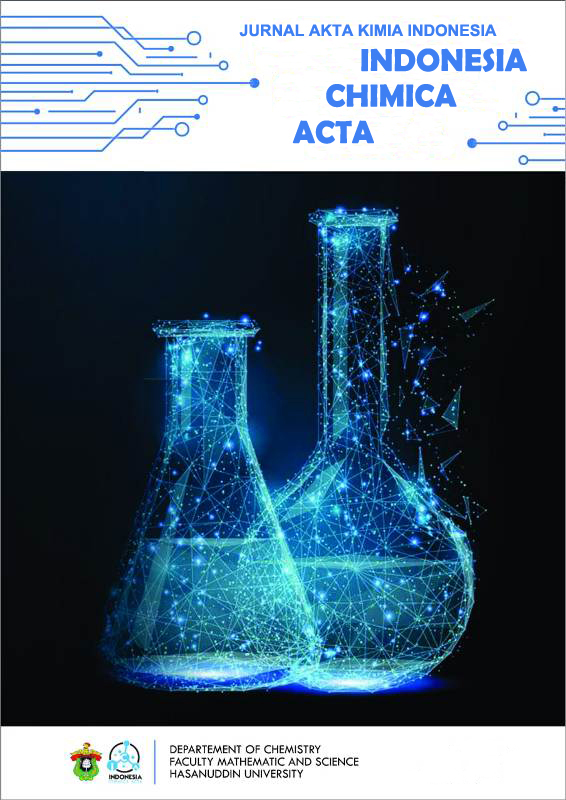BIOSORPTION OF Cu (II) METAL IONS BY DRAGON FRUIT SKIN (Hylocereus polyrhizus)
DOI:
https://doi.org/10.20956/ica.v11i1.6401Keywords:
Biosorption, AAS, Langmuir Isotherm, Ion Cu (II), Dragon Fruit PeelAbstract
Biosorption is an effective method for removal of heavy metals from their solutions. Biosorption of Cu (II) by contact time, pH, and concentration has been investigated. Concentration of Cu (II) ion before and after adsorption was determined using Atomic Absorption Spectrophotometer (AAS). The effect of the pH process was studied at pH of 2-7. The result showed that the optimum time for biosorption of Cu (II) ion by biomass dragon fruit was 10 minutes and pH 4 was the optimum pH of biosorption. Langmuir and Freundlich models were used for the adsorption of isotherm. Result showed that biosorption of Cu (II) by dragon fruit peel fit better the Langmuir model than Freundich model with the adsorption capacity (Qo) of 20.401 mg/g biosorbent. The result of FT-IR analysis showed that hydroxyl groups were responsible for the binding of Cu (II) ions.
References
Ahalya, N., Ramachandra, TV, and Kanamadi, RD., 2003, Biosorption of Heavy Metal, Research J. Chem. Environ., 7(4): 71-79.
Ahmad, A., Rafatullal, M., Sulaiman, O., Ibrahim, MH, Chii, YY, and Siddique, BM, 2009, Removal of Cu (II) and Pb (II) ions from solutions by adsorption on sawdust of Meranti wood, Desalination, 250: 300- 310.
Ashraf, MA, Maah, MJ, and Yusoff, I., 2010, Study of Banana peel (Musa sapientum) as a Cationic Biosorben, American-Eurasia, J. Agric. Enviro. Sci., 8(1): 7-17.
Budiyanto, E., Wardani, AY, and Nirmala, W., 2010, Utilization of Pineapple Leaves (Ananas comosus) as Ag and Cu Metal Adsorbents in Kotagede Silver Industry Waste, Unpublished Thesis, Department of Chemistry FMIPA UNY, Yogyakarta
Darmono, 2001, Environment and Pollution of Relationships with Toxicology of Metal Compounds, UI-Press. Jakarta.
Gatial, A., Mudra, M., Moncol, J., Dankova, M., Peter, L., and Breza Martin., 2014, Structure and Vibrational Spectra of copper (II) pyridylmethanolate tetrahydrate, Chemical Papers, 68( 7): 940-949.
Gulnaz, O., Saygideger, S., and Kusvuran, E., 2005, Study of Cu (II) Biosorption by Dried Activated Sludge: Effect of the Physico-Chemical Environment and Kinetics Study, J. Hazard . Matt., B120, 193-200.
Hawari, AH, and Catherine NM, 2006, Biosorption of Lead (II), Cadmium (II), Copper (II) and Nickel (II) by Anaerobic Granular Biomass. Bioresource Technal, 97: 692-700.
Kuraisy, A., 2008,Biosorbent, Unpublished Utilization of Rhizoma of Seagrass Rhizoma thallasia hemprichii which is on Barrang Lompo Island as Ion Cu (II) Thesis, Department of Chemistry FMIPA UNHAS, Makassar.
Kurniasari, L., 2010, "Utilization of Microorganisms and Agricultural Waste asRaw Heavy Metal BiosorbentMaterials"Magazine Scientific, Faculty of Engineering, Wahid Hasyim University Semarang, Moment Journal, 6(2): 5-8
Lelifajri, 2010, Adsorption of Cu Metal Ions (II ) Using Lignin from Saw Wood Powder Waste, Journal of Chemical and Environmental Engineering , 7(3): 126-129.
Lesage, E., et al., 2006, Sorption of Co, Cu, Ni and Zn from Industrial effluents by the submerged aquatic macrophyte Myriophyllum spicatum L., Ecol Eng, 30, 32-325.
Lin, YE, Vidic, RD, Stout, JE and Yu, VL, 2002, Negative Effect of High pH on Biocidal Efficacy of Copper and Siver Ions in Cotrolling Legionella pneumophila, AEM, 68(6): 2711-2715
Mallampati, R. , 2013, Biomimetic Synthesis Of Hydrid Materials For Potential Applications, A Thesis Submitted For The Degree Of Doctor Of Philosophy, Department Of Chemistry National University Of Singapore, Singapore.
Moo, BW, 2010,, Cu (II) Metal Biosorption by Using Tofu DregsUnpublishedThesis, Department of Chemistry FMIPA UNHAS, Makassar.
Namal, P., Linda BI Lim, Dahri, MK, and Tennakoon, DTB, 2013, Dragon Fruit Skin as a Potential Low-cost Biosorbent for Removal of Manganese (II) Ions, 2013, 8(3): 178-188 .
Pravasant, P., Apiratikul, R., Sungkhum, V., Suthiparinyanont, P., Wattanachira, S., and Marhaba, TF, 2005, Biosorption of Cu2+, Cd2+, Pb2+, and Zn 2+ using dried marine green macro algae Caulerpa lentillifera. Biores. Technol.
Septiany, I., 2008, Utilization of Thallasia hemprichii Rhizoma Seagrass Biomass on Barrang Lompo Island as Ion Cu (II) Biosorbent, Unpublished Thesis, Department of Chemistry FMIPA UNHAS, Makassar.
Tasaso, P., 2014, Adsorption of Copper Using Pomelo Peel and Depectinated Pomelo Peel, J. Clean. Energy. Technol., 2(2): 154-157.
Tikupadang, LJ, 2009,, Biosorption of Cu (II) Metal Ions by Sago DregsUnpublishedThesis, Department of Chemistry FMIPA UNHAS, Makassar.
Downloads
Published
Issue
Section
License
This is an open access journal which means that all contents is freely available without charge to the user or his/her institution. Users are allowed to read, download, copy, distribute, print, search, or link to the full texts of the articles in this journal without asking prior permission from the publisher or the author.
Jurnal Akta Kimia Indonesia (Indonesia Chimica Acta) operates a CC BY-SA 4.0 © license for journal papers. Copyright remains with the author, but Jurnal Akta Kimia Indonesia (Indonesia Chimica Acta) is licensed to publish the paper, and the author agrees to make the article available with the CC BY-SA 4.0 license. Reproduction as another journal article in whole or in part would be plagiarism. Jurnal Akta Kimia Indonesia (Indonesia Chimica Acta) reserves all rights except those granted in this copyright notice.



